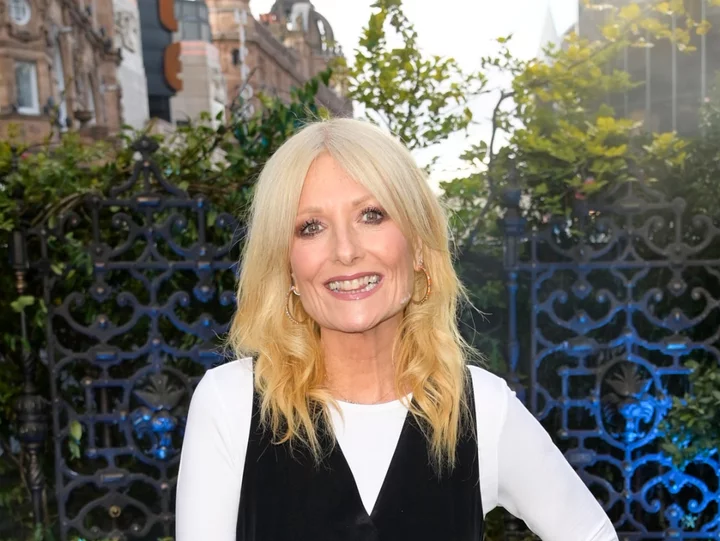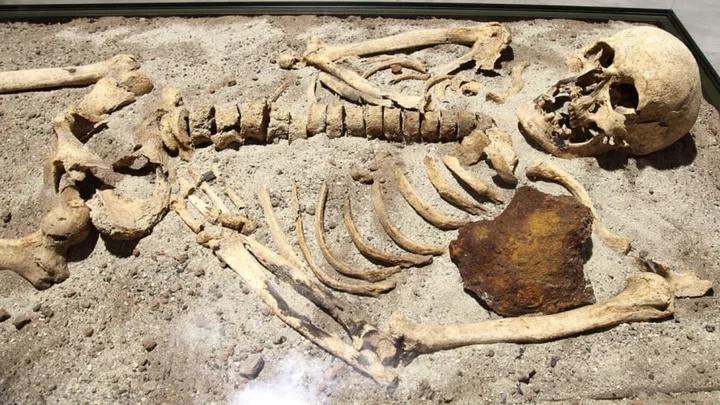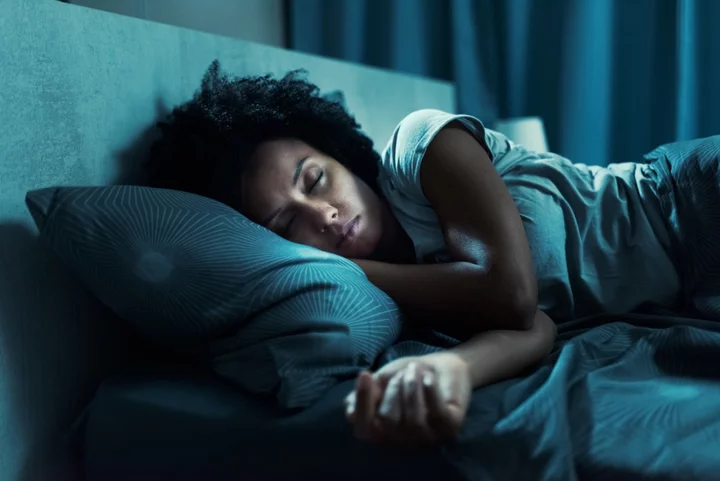
Gaby Roslin says she’ll ‘never apologise’ for saying she’s happy post-divorce
TV presenter Gaby Roslin has said she will “never apologise” for telling people she’s happy, after she experienced moments of grief following her divorce. The former The Big Breakfast presenter and author, 59, was married to musician Colin Peel for almost a decade. They share a daughter together. “Not all my life has been joyful. My mum died young. I’ve been through divorce and lost some of my dearest friends,” she told Prima magazine. “You go through those things and you realise that life is precious and, without sounding trite, I will never apologise for saying I’m happy.” Roslin’s mother died just over 20 years ago, around the time she was beginning a new job. The TV star said that it feels like she and her husband of 18 years, David Osman, “fit together”. She shares another daughter with Osman. “We still really appreciate what we have,” Roslin, who presents a show on BBC Radio London along with sints on BBC Radio 2’s The Zoe Ball Breakfast Show and BBC One’s Morning Live, said. “The things that makes it work is that we’re not in competition with each other: We’re very, very different.” Speaking about how “life is crappy for a lot of people”, she added: “I’m someone who has always been very positive and full of laughter, but I’m aware that it’s not something everyone can hold on to. “There are coping mechanisms that have helped me, and I know they can help others, too.” Roslin revealed that some of her personal coping mechanisms have included giving up alcohol five years ago, and going for walks. “There’s a lot of ageism out there,” she said. “It’s no secret in my industry, but it’s everywhere. You can’t do this or that if you’re a certain age. No! I’m lucky that I’ve carried on working, but I have friends who have experienced it. “I know an actor who, at 55, was going for the part of someone older than her and was told that she was too old. They cast a 40-year-old. That’s so wrong.” Roslin is preparing to release her new guided journal, Spread The Joy: Simple Practical Ways To Make Your Everyday Life Brighter, which focuses on stories, illustrations, anecdotes and tips and tricks. The full interview is available now in Prima’s November issue in supermarkets and online at Mags Direct. Additional reporting by Press Association. Read More Sophie Turner and Joe Jonas reach agreement after child custody row Who is Laura Gallacher, Russell Brand’s wife of six years? Everything we know about Katy Perry and Russell Brand’s short-lived marriage Why is my teenager sleeping so much? Sounds that can help you fall asleep better Holidays to the homeland could help children hold onto family’s original language
2023-09-27 18:26

Ukraine war: Cannabis in focus for veterans treatment
Ukraine is battling a colossal PTSD crisis and wants to try anything to help - including cannabis.
2023-09-27 12:50

Steelers legends accuse Patriots of cheating in AFC Championship blowout
Pittsburgh Steelers Jerome Bettis and Ben Roethlisberger let their imaginations run wild in frivolous accusations against Bill Belichick and the New England Patriots.
2023-09-27 07:49

Biden dog Commander bites another Secret Service agent
This is the 11th time Commander has bitten a guard at the White House or the Biden family home.
2023-09-27 07:24

Dan Campbell appears to be literally losing sleep over Lions-Packers
The Lions will play the Packers in Week 4 on Thursday Night Football. The short week matchup already has head coach Dan Campbell running on fumes.
2023-09-27 04:52

5 signs of frontotemporal dementia: Bruce Willis’s condition explained
Emma Heming Willis, actor Bruce Willis’ wife, provided an update on her husband’s health in a new interview with the Today show. She said being a celebrity does not change the reality of living with a disease like frontotemporal dementia. “You know what I’m learning is that dementia is hard. It’s hard on the person diagnosed, it’s also hard on the family,” she explained. “And that is no different for Bruce or myself or our girls. When they say this is a family disease, it really is.” Willis’ family first announced his diagnosis of frontotemporal dementia in March. At the time, they wrote they had the “deepest gratitude for the incredible outpouring of love” following the initial news. Here we take a closer look at the condition, known as FTD. – What is FTD? FTD refers to a group of illnesses that primarily affect the frontal and temporal lobes of the brain, which are associated with behaviour, personality, and language, per the Mayo Clinic. It’s often misdiagnosed as Alzheimer’s disease or a psychiatric problem, and it often begins between age 40 and 65. FTD accounts for between 10 and 20 per cent of all dementia cases. – What causes FTD? It’s not clear what causes FTD. Certain genetic mutations have been linked to the condition, but many people who develop FTD do not have a family history of the illness. The NHS says that, like other forms of dementia, FTD tends to develop slowly and get gradually worse over the years. – What are the symptoms of FTD? There are two types of FTD – behavioural variant FTD (bvFTD) and primary progressive aphasia (PPA). BvFTD, which results from damage to the frontal lobes of the brain, mainly causes problems with behaviour and personality. PPA, when damage occurs to the temporal lobes on either side of the head nearest the ears, causes language problems. Alzheimer’s UK says that FTD symptoms are “very different” to other more common types of dementia, such as day-to-day memory loss – adding that in the early stages of the disease, many people can still remember recent events. The symptoms can be distressing to family members, as they include lack of judgment, inappropriate social behaviour, decline in personal hygiene, compulsively putting things in one’s mouth, and eating inedible objects. People may also show a lack of interest in their activities, which is sometimes mistaken for depression, and they may exhibit a lack of empathy. – How is FTD treated? According to Dementia UK, there is no prevention or cure for FTD and it is often best to “focus on practical strategies to help the person live as well as possible with the diagnosis”. Willis’ family said that the lack of treatment for the disease was “a reality that we hope can change in the years ahead” with further research. They added that they hope media attention will be used to raise more awareness of FTD. “Bruce always believed in using his voice in the world to help others, and to raise awareness about important issues both publicly and privately,” they said. “We know in our hearts that – if he could today – he would want to respond by bringing global attention and a connectedness with those who are also dealing with this debilitating disease and how it impacts so many individuals and their families. “Bruce has always found joy in life – and has helped everyone he knows to do the same.” Read More Charity boss speaks out over ‘traumatic’ encounter with royal aide Ukraine war’s heaviest fight rages in east - follow live Kate gives a lesson in autumnal power dressing in a green trouser suit How can I boost my soil when I go peat-free? See Cate Blanchett champion sustainable fashion at glamorous Giorgio Armani show
2023-09-27 02:26

8 Historical Methods for Keeping the Dead in their Graves
People tried their best to keep the dead from rising again with scythes, chains, nails, and more.
2023-09-27 00:15

Black Grape announce new album and UK tour
Shaun Ryder's band Black Grape has announced the new album 'Orange Head' and concert dates in the UK later this year.
2023-09-26 23:28

Ben Roethlisberger, Jerome Bettis Accuse Patriots of Cheating in 2004 AFC Championship Game
The two former Steelers break down how the Patriots cheated back in 2004.
2023-09-26 23:25

Buccaneers coach gave Jalen Hurts more motivation for his own flu game
Philadelphia Eagles QB Jalen Hurts used previous disrespect from a Tampa Bay Buccaneers coach to motivate himself prior to Monday night's victory.
2023-09-26 22:52

Sounds that can help you fall asleep better
A sleep expert has revealed which sounds help you get to sleep – and which ones are the best to wake up to. Sleep expert Hannah Shore claims ocean waves, a crackling fire and the distant buzzing of a fan are among the top ten sounds that help people fall asleep. Whereas hearing a piece of toast being cut or a kettle boiling is most likely to make them rise and shine gently. It comes after a poll which looked at 2,000 adults, found half enjoy listening to white noise to go to sleep or wake them up. The study, commissioned by Premier Inn, found 26 per cent listen to it every night, with rainfall sounds (40 per cent), music (34 per cent) and the sound of a fan (24 per cent) among the top choices. The hotel chain has launched Nod-Flix: an ASMR channel where guests can have their optimal video and soundscape play as they drift off. Hannah Shore, who is working with the hotel brand in partnership with Silentnight, said: “Depending on the individual, watching or listening to something calming before bed can be part of our sleep process. “Different sounds generate different responses from our subconscious when we’re asleep, so what might be soothing to one, might not be for another. “If you’re sharing a bed or a room, be considerate and invest in a pair of headphones or why not try finding a sound that you both find soothing?” The study also found that if they are sharing a room with other people and unable to listen to their white noise, 27 per cent wouldn’t be able to sleep properly as a result. More than half (58 per cent) normally listen to these sounds or noises on their phone, while 34 per cent tune in via an app. But 15 per cent even have a sound machine. Wind sounds (21 per cent), audiobooks (16 per cent) and a cat purring (seven per cent) also made the list of sounds and noises people like to fall asleep to. It also emerged half of the adults polled feel their sleep varies depending on the season we’re in. And 57 per cent reckon they sleep the best during autumn or winter, compared to only seven per cent who get the best shut-eye over the summer months. Respondents were shown a number of hotel-inspired ASMR type videos from the Nod-Flix channel, from the kettle boiling to a suitcase being pulled along hard floor. It found the sound of sizzling bacon was found to be most relaxing, followed by the trickle of running water from the shower. The study carried out via OnePoll.com, also revealed the sound of a vacuum was surprisingly least calming. Hannah Shore, for Premier Inn, added: “Switching off does not come as easy to some people as it does others and sounds are a great way to help with this. “Some people prefer complete silence whereas to others the silence means they listen out for all the little sounds, in a hotel this can be people walking down the hall, doors closing, the lift. “Others may find they need their brain to concentrate on something else, in these cases there needs to be something in the sounds they can focus on like the slow rhythm of calming music, the repetitiveness of waves lapping on the beach or even the noise of the TV. “This can allow the mind to switch off from the day and therefore allowing you to fall asleep, which we hope the Nod-Flix channel will accomplish for many.” Some noises that help Brits sleep better: Rainfall sounds Music Ocean sounds The sound of a fan The sound of favourite TV show/ streaming service Wind sounds Podcasts Audio Books Jungle/forest/woodland sounds Fireplace sounds Static sounds City ambience Animal sounds A cat purring The sound of a vacuum cleaner Here are some tips for a restful sleep: If you’re going to watch something before bed, make sure it’s calming content Keep the space you’re sleeping in tidy Don’t eat a heavy meal before bed Invest in some bed socks – they help increase blood circulation Make sure your pillow supports your sleeping position Dim the lights – it helps our bodies to produce sleep hormones like melatonin Get some black out blinds or curtains to block out bright lights White noise such as fans, hairdryers, hoovers are great for blocking out sound. If you want to go to sleep in a calmer way, pink noise is also good - think of wind, steady rain and reselling leaves. Green noise is similar to pink but will have an undertone of more constant hissing noise but still nature led such as running streams. To help you focus throughout the day, brown noises such as the crack of thunder which have deeper tones works really well. Read More Sleep expert reveals the simple secret to a good night’s rest Irregular sleep patterns linked to harmful gut bacteria, study suggests What is the 10-3-2-1-0 sleep method? How to spend the perfect healthy Super Saturday – according to science Holidays to the homeland could help children hold onto family’s original language The cure for smelly garlic breath? Turns out, it’s simpler than you think
2023-09-26 20:24

Stormzy set for 2024 Formula One British Grand Prix performance
Stormzy, Pete Tong's Ibiza Classics and Rudimental are the acts currently confirmed to play Silverstone.
2023-09-26 17:21
